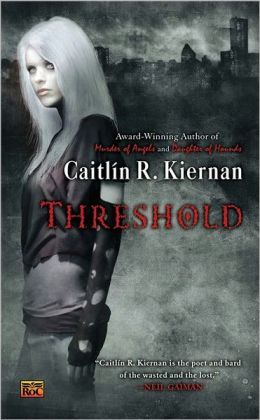Threshold, by Caitlin R. Kiernan
Jun 30
2014

Caitlin R. Kiernan's novel Threshold is 90% atmosphere, 10% plot. That's not necessarily a complaint, but anyone setting out to read this novel better be prepared for the literary equivalent of visiting a haunted house that consists mostly of smoke machines being blown in your face, with only occasional, unsatisfying glimpses of an actual monster.
Threshold opens with an ill-fated trip to an old waterworks in Birmingham, Alabama, where paleontology student Chance Matthews, her alcoholic, underemployed boyfriend Deke, and their friend Elise witness something terrible (but undefined). Fast-forward a few months, and Elise has committed suicide, Chance is is lurching through life in a depressive stupor, and Deke has somehow secured a new girlfriend, aggressively Goth-cute Sadie. When Chance meets a mysterious girl who claims to be on a holy mission, she and Deke are drawn together again... but it becomes horrifyingly clear that they are totally unprepared to fight the evil that seems to be lurking at the edges of their lives.
My biggest complaint about Threshold was its characters. While Kiernan provides solid reasons for her protagonists' consistently terrible behavior, that didn't make it any easier to like them, or emotionally invest in their relationships. (I mean, was I supposed to be on the edge of my seat, wondering if cold, gloomy Chance was going to reconcile with Deke the Self-Pitying Drunkard? Because I totally wasn't.) Making things worse, the story's conclusion [SPOILERS AHEAD] is a high-brow riff on one of my least-favorite literary devices: “It was all a dream... or was it?” There were several moments of unsubtle foreshadowing indicating an inconclusive ending was on its way, but I didn't slog through 300+ pages of vaguely-defined horror only to be told I'd just read an epic account of a bad trip. (Or not. Maybe.)
That being said, I do think it would be possible to enjoy this story—as long as one approaches it from the correct perspective. Rather than expecting a conventional horror story, I suggest reading Threshold like a long, terror-themed poem. If I'd known no typical storytelling conclusion was forthcoming, I might have appreciated Kiernan's skillful use of smoke and mirrors to create a memorably Gothic atmosphere, even if her collection of unreliable narrators still feels like an irritating cop-out.
Threshold opens with an ill-fated trip to an old waterworks in Birmingham, Alabama, where paleontology student Chance Matthews, her alcoholic, underemployed boyfriend Deke, and their friend Elise witness something terrible (but undefined). Fast-forward a few months, and Elise has committed suicide, Chance is is lurching through life in a depressive stupor, and Deke has somehow secured a new girlfriend, aggressively Goth-cute Sadie. When Chance meets a mysterious girl who claims to be on a holy mission, she and Deke are drawn together again... but it becomes horrifyingly clear that they are totally unprepared to fight the evil that seems to be lurking at the edges of their lives.
My biggest complaint about Threshold was its characters. While Kiernan provides solid reasons for her protagonists' consistently terrible behavior, that didn't make it any easier to like them, or emotionally invest in their relationships. (I mean, was I supposed to be on the edge of my seat, wondering if cold, gloomy Chance was going to reconcile with Deke the Self-Pitying Drunkard? Because I totally wasn't.) Making things worse, the story's conclusion [SPOILERS AHEAD] is a high-brow riff on one of my least-favorite literary devices: “It was all a dream... or was it?” There were several moments of unsubtle foreshadowing indicating an inconclusive ending was on its way, but I didn't slog through 300+ pages of vaguely-defined horror only to be told I'd just read an epic account of a bad trip. (Or not. Maybe.)
That being said, I do think it would be possible to enjoy this story—as long as one approaches it from the correct perspective. Rather than expecting a conventional horror story, I suggest reading Threshold like a long, terror-themed poem. If I'd known no typical storytelling conclusion was forthcoming, I might have appreciated Kiernan's skillful use of smoke and mirrors to create a memorably Gothic atmosphere, even if her collection of unreliable narrators still feels like an irritating cop-out.
Posted by: Julianka
No new comments are allowed on this post.
Comments
No comments yet. Be the first!